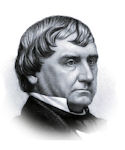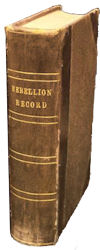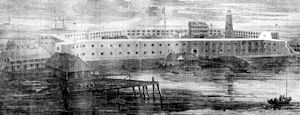—In the Massachusetts State Legislature to-day, a series of resolutions was passed by a unanimous vote, tendering to the President of the United States such aid in men and money as he may request, to maintain the authority of the general Government. The preamble to the resolution declares that the State of South Carolina, in seizing the fortifications of the Federal Government, the Post Office, Custom Home, money; arms, munitions of war, and by firing upon a vessel in the service of the United States, has committed an act of war. The Senate passed a bill authorizing the increase of the volunteer military of the State.—Boston Journal, Jan. 19.
WASHINGTON, January 18, 1861.
His Excellency Governor PERRY, Tallahassee, Fla:
We think no assault should be made. The possession of the fort is not worth one drop of blood to us. Measures pending unite us in this opinion. Bloodshed now may be fatal to our cause.
JNO. SLIDELL.
J. P. BENJAMIN.
A. IVERSON.
JNO. HEMPHILL.
LOUIS T. WIGFALL.
C. C. CLAY, JR.
BEN. FITZPATRICK.
JEFF. DAVIS.
S. R. MALLORY.
We sent this to Chase to-day.
HEADQUARTERS FORT JEFFERSON, TORTUGAS,
January 18, 1861.
SIR: I have the honor to report that I arrived at Fort Jefferson today with my command; garrisoned and assumed command of the post, in accordance with the instructions of the General-in-Chief, dated Washington, January 5, 1861. Strength: four commissioned officers and sixty-two enlisted men, Bvt. Maj. L. G. Arnold, commanding; Surg. A. N. McLaren, First Lieut. Henry Benson, A. A. Q. M and A. C. S.; First Lieut. M. M. Blunt. I would respectfully inquire if Fort Jefferson is a double-ration post? If not, I request that it be announced as such in orders from the War Department, from the 18th instant.
I am, very respectfully, your obedient servant,
L. G. ARNOLD,
Brevet Major, U.S. Army, Commanding.
Col. S. COOPER,
Adjt. Gen. U. S. Army, Washington City, D.C.
FRIDAY 18
The discussions in Congress are now very pointed and interesting. An attack upon Fort Sumpter is expected since the Prest flatly refuses to Treat with Col Hayne the last Comr from S.C. for its peacable surrender. If the attack is made it will be no holiday job for the “fireeaters.” The weather today has been wet & foggy, nearly cold enough to freeze. Got letter from Julia. She is expecting to come if she has a good opportunity but seems to adapt herself to circumstances with much facility and will not complain if she stays there during the vacation. She seems contented & happy.
![]()
______
The three diary manuscript volumes, Washington during the Civil War: The Diary of Horatio Nelson Taft, 1861-1865, are available online at The Library of Congress.
THURSDAY 17
There has been no startling News today, but the right of Secession is contested by all northern men who with the president consider it Revolution. I have not hesitated to call it Treason. I was at Willards this evening. People generaly are less excited than they were a week ago, and since the Cabinet has been purged of Secessionists and the President has taken a stand for the Union and the Constitution we all feel much better. It is now thought that “secession” will be at a discount soon even in the South. Became acquainted with Mr Fitman (Sigma), Mr Cluskey &c.
![]()
______
The three diary manuscript volumes, Washington during the Civil War: The Diary of Horatio Nelson Taft, 1861-1865, are available online at The Library of Congress.

DNC Chairman August Belmont to W. H. Seward: “…nothing can prevent Virginia, Tennessee, North Carolina, and Kentucky, from joining the movement of the cotton States…,”
To The Hon. W. H. SEWARD,
United States Senate, Washington, D. C.
New York, January 17, 1861
My Dear Sir,—I had intended for the last few days to express to you my sincere admiration of your patriotic and statesmanlike speech in the United States Senate, on Saturday last, but have been prevented by indisposition until to-day.
The graphic and masterly manner with which you depict the blessings of the Union, and the inevitable calamities of its dissolution, will, I trust, open the eyes of the extreme men on both sides to the madness of their course. In paying to your patriotism a willing tribute of the gratitude of a political opponent, for the manly stand which you have taken, may I also be allowed to express the hope that we may look forward to your leading your party further on in the path of moderate and conciliatory measures, which alone can save us from all the horrors of dissolution and civil war.
Without wishing for a moment to defend the revolutionary proceedings of South Carolina, and some of the other cotton States, I may be allowed to express my intimate conviction, based upon information from the most conservative men in the border States, that nothing can prevent Virginia, Tennessee, North Carolina, and Kentucky, from joining the movement of the cotton States, unless compromise measures, based upon the propositions of Senator Crittenden, can be carried bv a sufficient majority through Congress, to insure their embodiment in the Constitution.
I know that many, if not most of the Republican leaders are, until now, opposed to these measures, but do they represent the real feeling of their constituents? I think not; the large masses of our Northern people are, by an overwhelming majority, devotedly attached to the Union. They are ready and anxious to bring every sacrifice for its preservation, and will, to a man, abide by your doctrine: “Republicanism is subordinate to the Union, as every thing else is, and ought to be.”
If we could get at the true sentiment of our people throughout the North, I think we might get over our present difficulties; in fact, I do not see any other means of saving the Union. I therefore approve most cordially of your suggestion for a general convention, and hope only that you could be induced to modify your recommendation, so as to make this appeal now, and not in two or three years.
If, by a tardy action, the tobacco States are allowed to cast their lot with the seceders, and thus form a powerful Southern Confederacy of fifteen States, as they will most assuredly do unless an equitable compromise on the territorial question can be obtained, I .fear that a reconstruction of our confederacy would be utterly hopeless hereafter.
Providence has assigned to you a position of great and fearful responsibility in this crisis. You can preserve this great Union, with all its untold blessings, not only to the millions of freemen who congregate under its protecting wing, but to the oppressed in every portion of the inhabited globe. The downfall of our government would be the death-knell to political and religious liberty in both hemispheres. You have the sympathies of every patriot with you in the course which you have initiated by your great speech. The manifestations, on the part of prominent men of both parties, are most unequivocal in their sincere approbation of the stand which they hope to see you take.
Your efforts will entitle you to the gratitude of the whole American people, and vou will change the proud position of the great leader of a victorious party for the more exalted and honorable one of the benefactor and savior of your country.
—The names of William L. Yancey of Alabama, and James H. Hammond of South Carolina, appear in the Apalachicola Times of this day, as candidates for the presidency and vice-presidency of the Southern Confederacy.
WEDNESDAY, JANUARY 16, 1861.
Another wet misty day. Splashy sidewalks and mudy crossings. Letter from Frank today through Chas dated Fort Kearney, N.T., attached to the U.S. Army acting as comdt clerk, well & healthy. The “Secession fever” seems to me to be rather subsiding. The “Secession” Clerks in the Census Bureau were notified today that they could resign, otherwise they would be dismissed. The same thing should be done in all the Departments of the Govt. Went to the Assemblys church tonight to hear Mr. Collins Lecture on Japan, but the Lecture was on So. America. It was not uninteresting. There was also a Lecture at the “Smithsonian” on the Polarization of light, but it is too far off and the walking was too bad for wife.
![]()
______
The three diary manuscript volumes, Washington during the Civil War: The Diary of Horatio Nelson Taft, 1861-1865, are available online at The Library of Congress.

“These facts, if well founded, place the country in imminent risk of civil war…;”—Diary of George Mifflin Dallas, United States Minister to England
1861. January 16. — I have been kept for a week, and am still, in a state of great anxiety about the dangerous political excitements at home. The President has taken an attitude less friendly to the secessionists. This has been owing, it would seem, to the occupation of Fort Moultrie and the seizure of a revenue cutter, in the harbour of Charleston, by the South Carolina authorities. General Floyd, as Secretary of War, had pledged his honour to Governor Pickens that there should be no change in the status of the fortifications in the harbour.
Major Anderson, in command, with prudent strategy, shifted his little garrison of twenty men from Fort Moultrie to Fort Sumter. The South Carolina Commissioners at Washington protested, alleging breach of faith. Floyd demanded orders to Anderson to go back. The President declined. Governor Pickens sent militia into Fort Moultrie and seized a United States cutter. Floyd resigned on 29th of December, and his resignation was quietly accepted on the 31st by the President, who appointed Postmaster-General Holt to conduct the department until a successor was named. The President has addressed Congress, announced his determination to protect the property and collect the revenue of the United States with all the power at his disposal, and is said to have directed the frigate Brooklyn to be held in readiness at Norfolk, while two revenue cutters are proceeding to Charleston harbour, on board which a new Collector, McIntyre, of Pennsylvania, will exact the duties on imports. In the interim reinforcements are being sent to Southern garrisons, as a determination to seize them has shown itself in Georgia, Alabama, and North Carolina. These facts, if well founded, place the country in imminent risk of civil war; and if, at the bottom of the whole, there exist, as Mr. Daniel, our Minister to Turin, vehemently assured me on Monday last was the case, an immense majority in the South who desire disunion and have been preparing to accomplish it for twenty years, it would seem that a sanguinary convulsion is unavoidable. Perhaps a large movement of militia, similar to the one made by Washington in 1794 against our Whiskey Insurrection, would overawe the disaffected and restore tranquillity. Certainly, South Carolina has taken, by capturing forts and cutters, a more decisively insurrectionary character than could be attributed to the disorderly riots of Pennsylvania.
My old friend “Betsey Bonaparte” and her son have enlisted Berryer and Legrand in a trial to come of on the 25th inst., before the Court of First Instance in Paris, asserting the validity of the marriage of Jerome in Baltimore in 1803, and claiming to share in the property he has left. If the marriage be sustained, the necessary result would be the illegitimacy of Prince Napoleon and Princess Mathilde. Here is fine garbage for Imperial scandal! and “Betsey” is not one, though she can’t lack much of eighty, to shrink in the pursuit of money or to be scared by a crown.

“You rightly designate the firing into the Star of the West as ‘an act of war…,’”—Operations in Charleston Harbor
WAR DEPARTMENT, January 16, 1861.
Maj. ROBERT ANDERSON,
First Artillery, Commanding Fort Sumter:
SIR: Your dispatch No. 17, covering your correspondence with the governor of South Carolina, has been received from the hand of Lieutenant Talbot. You rightly designate the firing into the Star of the West as “an act of war,” and one which was actually committed without the slightest provocation. Had their act been perpetrated by a foreign nation, it would have been your imperative duty to have resented it with the whole force of your batteries. As, however, it was the work of the government of South Carolina, which is a member of this confederacy, and was prompted by the passions of a highly-inflamed population of citizens of the United States, your forbearance to return the fire is fully approved by the President. Unfortunately, the Government had not been able to make known to you that the Star of the West had sailed from New York for your relief, and hence, when she made her appearance in the harbor of Charleston, you did not feel the force of the obligation to protect her approach as you would naturally have done had this information reached you.
Your late dispatches, as well as the very intelligent statement of Lieutenant Talbot, have relieved the Government of the apprehensions previously entertained for your safety. In consequence, it is not its purpose at present to re-enforce you. The attempt to do so would, no doubt, be attended by a collision of arms and the effusion of blood–a national calamity which the President is most anxious, if possible, to avoid. You will, therefore, report frequently your condition, and the character and activity of the preparations, if any, which may be being made for an attack upon the fort, or for obstructing the Government in any endeavors it may make to strengthen your command.
Should your dispatches be of a nature too important to be intrusted to the mails, you will convey them by special messengers. Whenever, in your judgment, additional supplies or re-enforcements are necessary for your safety, or for a successful defense of the fort, you will at once communicate the fact to this Department, and a prompt and vigorous effort will be made to forward them.
Very respectfully, your obedient servant,
J. HOLT.






